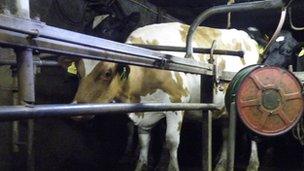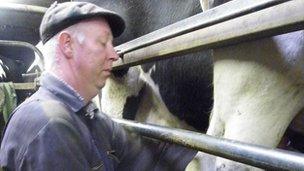How to turn grass into milk - and lose money doing it
- Published

Farmers say the squeeze on their margins has seen profits disappear
"Grass is all we grow. And we try to turn that into milk."
Willie Campbell talked to me in the middle of milking, at his family farm near Mauchline in East Ayrshire.
He has 140 dairy cows. At any one time about 120 of them are giving milk.
Milking them takes two hours, twice a day. Starting at five in the morning, and again at about four in the afternoon they process into the parlour, 12 at a time.
Altered economics
Each year the herd produces 800,000 litres of milk. But, Mr Campbell says, the current pricing regime means he will lose about six pence on every single litre.
That means milking his cattle costs him £48,000 a year. In other words, he's losing roughly £1,000 a week. Every week.
No wonder he concedes that the economics "don't make sense".
He says the situation has come about because feed costs have practically doubled in the past two years.
At the same time the price paid by milk processors has gone down.
"What we're receiving, over the past four months, has gone from about 29 pence per litre, and it's going to be down to between 24 and 25 (pence)," he says.
I've just gone and checked my last supermarket receipt. At the weekend, I paid £1.10 for two pints - or, as the label on the carton helpfully converts it, just over one-point-one litres.
But, of course, after the milk is collected from the farm it has to be pasteurised and processed, bottled, and distributed to outlets all over the country.

Willie Campbell is joining a protest at Westminster later on Wednesday
And the processors and the retailers need to pay for all of that, and turn an honest profit.
Mr Campbell accepts that. But, he says, "we would like a return, as well".
He adds: "I would never grudge the consumer getting a good buy. And I know these are hard times for us all.
"But, nonetheless, I'm absolutely convinced that the difference between what you pay as a consumer and what I receive as a producer is vast.
"I'm not going to point the finger at the processor, or the retailer. But somewhere there is something wrong, that's not allowing enough to get back. It's not sustainable if the man at the bottom is not getting enough to keep going."
Next generation
That's why he left the farm early this morning, and headed down to London to join dairy farmers from across the UK in putting their case at Westminster later.
"I want to make sure that those that make decisions understand the dire situation that myself and fellow farmers are in," he says.
"I want them to understand that I'm not wingeing. I'm not looking for something on a plate that I don't deserve. But I am looking for a bit of sustainability coming into the marketplace.
"I'm looking for enough money back to allow me to give my family a reasonable living, and to build up the business for the next generation.
"I took this business over from my father. We've built it up, and I'm proud of it. And I would hate to see it slip through our fingers now."
- Published11 July 2012
- Published10 July 2012
- Published9 July 2012
- Published29 June 2012